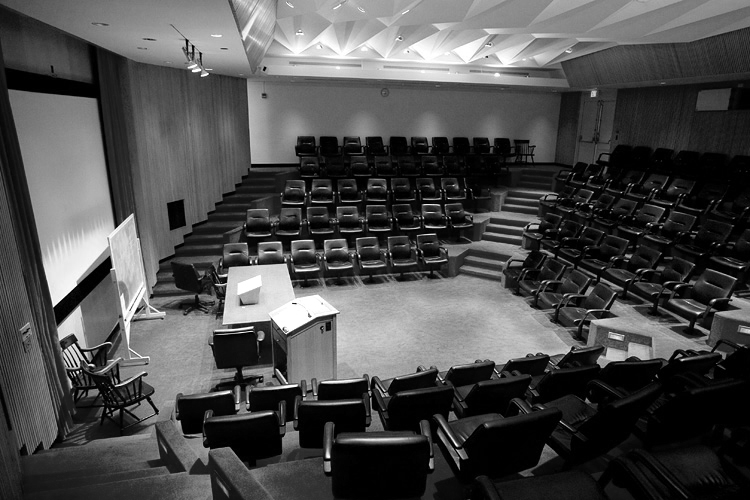

During this Monday’s Senate meeting, AAS President Tania Dias, ‘13, invited President Martin, Dean Charri Boykin-East and Dean Hannah Fatemi to answer questions or address concerns from the entire student body.
The meeting began with a public comment period, a practice that was started this year, where non-senators are given an opportunity to talk about anything they want at the beginning of the Senate meeting. In the past, students would have to wait until the end of the meeting to bring up comments. It was during this period that anyone in the room had the opportunity to approach any of the three members of administration present with their questions.
Matthew DeButts, ’14, asked President Martin and Dean Boykin-East about the timeline and proposal process regarding recent discussions about moving the MRC into the game room, and who was in charge of the decision-making process.
Currently, the MRC is located in the basement of Keefe, an area most students do not visit. Though Amherst’s peer institutions have multiple full-time members working at the MRC, Amherst has only one. These are issues President Martin felt were important to address.
“I will take responsibility for having said that, for now, almost a year, that having a MRC in the basement, tucked away in a spot of the sort where it is now, is deeply problematic in my opinion— actually, symbolically and in a host of other ways,” President Martin said. “I think Amherst should be the multicultural center, as opposed to just having one. But until we get to a place where people feel it really is a multicultural center, we also need some place that’s celebratory and recognizes the differences among us. So we cannot be tucked away in a space in the basement, that says all the wrong things about who we are,” President Martin said.
In last week’s Senate meeting, the topic of joining an online consortium of other colleges had been discussed. JJ Hoffstein, a Senator for the class of 2014, asked about President Martin’s general thoughts on this process.
“What we’re doing right now is learning more. We’re trying to figure out what value it would bring to Amherst. Our top priority is to find a consortium we might want to join that would help think about pedagogy on campus,” President Martin said.
Most of the rest of the questions of the night revolved around recent rumors regarding the school’s alcohol policy. Noah Gordan ’14, the AAS Secretary, asked about the lapse of communication between the administration and student body that has been shown through rumors about changes in the alcohol enforcement policy.
“There’s no change to the alcohol policy at all. What I did see is that there has been more focus on the issues around Title IX and that part of the training that goes on in Title IX also talks about being on notice,” Dean Boykin-East.
She also addressed the Facebook page invitation to an on-campus 1000 Beers party that supposedly went out to around 500 students. A student informed Dean Boykin-East about this party, prompting her to contact the students who had organized the party.
“I had a choice to either let the event go on and campus police would perhaps break it up ... or to get in touch with the individuals, as we have done a couple of other times this semester, and say, ‘I’m going to remind you of what the alcohol policy is, and this is how you would go about hosting an event.’ That’s the truth of how we address these concerns this year, but there’s been no change in the alcohol policy,” Dean Boykin-East said.
In regards to party policies in general, Diaz added that the AAS is planning an all-student conversation inviting members of administration that deal with this issue.
“We’re also engaging in conversations to revamp the party policies at Amherst, and that will go through College Council, so we can tweak it and streamline it and make it more appropriate to what happens currently,” she said.
Daniel Pastan ’13 continued the discussion on this topic, asking about the rumors that drinking games have been banned, which have increased since the instances in recent weeks of drinking games being broken up on campus. He explained that he knew that although there was not a change in the administration, “experientially” there was a change.
“I approached a group of college police officers who told me that this [the ban] was true and that if they see students participating — playing beer pong, which is a very commonly played game on this campus, where you throw ping pong balls at cups — that that’s not allowed,” he said.
Dean Boykin-East replied that, in her understanding, the student handbook has always prohibited drinking games.
“I can’t pay attention to one set of rules and regulations and completely ignore the other. I do think that we need to be working with Dean Fatemi and the rest of you to really look at ways of having more activities that go beyond people just drinking,” she said.
Dean Fatemi added that one of the discussions among the AAS last year regarding alcohol had been the idea that the Social Council should work to organize more events for students who are 21- 21 years or older.
“When that organization can host 21-plus events for students of age to get together in the way that complies with our policies, it creates more community building for students. Those events are being planned [and] there will be one at the end of the semester. If students work within the policies to host those events, it is doable,” she said.